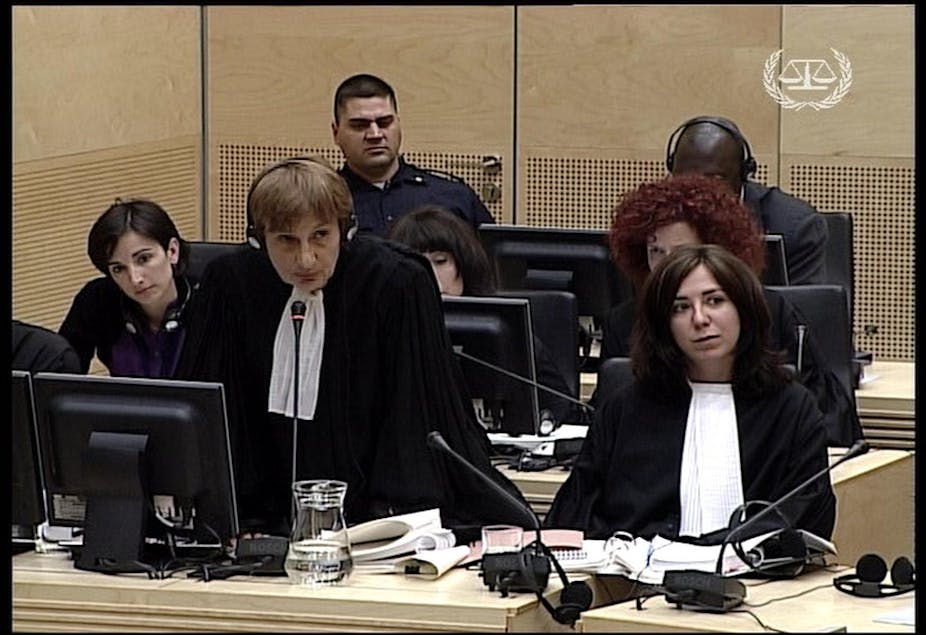The African Union will hold a summit from October 11-13 to consider a mass withdrawal of the 34 African member states of the International Criminal Court (ICC). This would be in response to the trials of Kenya’s Deputy President William Ruto and President Uhuru Kenyatta and the perception that the ICC “hunts Africans”.
The vote threatens to seriously endanger the ICC and raises questions about what the court has delivered in its first decade of operation. Given the ICC’s innovative mandate to advance gender justice, it is worth asking specifically what would be lost in terms of women’s rights if the ICC collapsed.
Many women’s rights actors greeted the 1998 Rome Statute establishing the ICC with jubilation. Largely due to their efforts at the negotiation stage, the ICC’s mandate to address impunity for war crimes, crimes against humanity and genocide also included atrocities commonly experienced by women, including a broad range of sexual and gender-based crimes.
These advocates were also successful in securing rules for a “fair” representation of women on the ICC’s judiciary and dedicated positions for gender experts across the court’s operations, including in the powerful Office of the Prosecutor.
Just over ten years since the court opened its doors, it has produced some important advances in gender justice. We have seen improvements in the way international criminal law recognises crimes against women and girls. Charges of gender-based crimes have now been brought in 11 of the 16 cases currently before the court, a proportion of almost 70%. This is a much better record than the earlier UN ad hoc tribunals for Rwanda and the former Yugoslavia.
More women on the bench
One irrefutable area of progress has been the ICC’s record on the representation of women judges. The court’s bench is 60 per cent female, standing in stark contrast to the International Court of Justice, which has only ever included four women judges in its 90-year history. Importantly, in line with Rome Statute provisions, most of the ICC’s female judges, as well as some of their male counterparts, have a history of investigating or adjudicating issues of sexual and gender-based violence in other settings.
The appointment in 2012 of Fatou Bensouda as the ICC’s second chief prosecutor, who came to office pledging to investigate crimes of sexual violence as a priority during her seven-year term, also sends a positive signal that women’s experiences of conflict are taken seriously.

Gender justice has also been strengthened through redress measures for victims, including the gradual development of reparation principles that recognise women and men’s different experiences of war and conflict and the need to address these in post-conflict settings without reinforcing gender inequalities.
This is not to suggest that the implementation of the ICC’s gender justice has been seamless. Numerous problems exist. For example, charges of sexual or gender-based crimes are especially vulnerable to collapse, with 50% of these charges failing to make it to trial. This is the result of two problems: weak evidence presented by the prosecutor and, in some cases, regressive judicial interpretation of the law.
Other problems include the lack of prioritisation of crimes of sexual and gender-based violence in the court’s investigations and poor resourcing for the critical outreach and victims’ services that benefit women.
What if the Court collapses?
Given these partial advancements in gender justice in the first decade of ICC, should we care if the AU vote provokes the court’s collapse?
The ICC is imperfect, no doubt, but it does offer an unprecedented framework for advancing women’s rights, key aspects of which are gradually being put into place. The full recognition of the Court’s gender justice mandate is likely to arrive in small, highly contested steps, but as a whole it does have the potential to be transformative.
In order for such a transformation to occur, three practical steps are required in the next decade. The first is for key actors within the Court to recommit to and fully execute - through investigations, judicial interpretation and outreach and victims services - the strong gender justice mandate that is embedded in the Rome Statute.
The second is for international and national women’s rights organisations to build stronger links with the Court; they are needed to pressure states to live up to their statutory obligations and to make the ICC accountable for its gender justice mandate at each critical turn.
Finally, the ICC needs to better co-ordinate with the international architecture on women’s rights, including the UN’s women, peace and security agenda, which is can act as an important complement to the work of the Court.
The ICC still has considerable room for improvement in addressing women’s rights, but we’d be worse off without it. The AU vote is important on many levels, including reminding us that to combat impunity for sexual and gender-based crimes amongst others, the ICC - and the international community more broadly - must not just focus on Africa. It must pay attention to wherever these crimes happen globally and we must acknowledge that gender injustices are an international problem that require an international solution.
Louise Chappell delivers the University of Edinburgh’s annual Chrystal Macmillan Lecture on October 8

